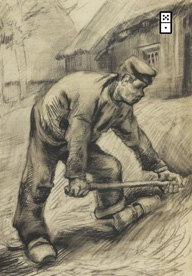Podcast: Play in new window | Download
Subscribe: RSS

Steve has just released a follow-up to The War of Art called Do the Work, in which he walks you through the process of tackling a creative project from start to finish – including the difficult, scary and downright frustrating obstacles you’ll encounter along the way.
In this conversation Steve shares some of the big ideas from Do the Work, including:
- How to anticipate and deal with ‘Resistance points’
- The positive side of Resistance
- Why crashing and burning is a sign you’re on the right track
- How to earn the Assistance of the Muse
- The importance of staying stupid
He also talks about new opportunities for authors and book publishers, based on his experience of publishing Do the Work with The Domino Project, the innovative new publishing venture from Seth Godin.

Here’s a video Steve refers to in the conversation: Elizabeth Gilbert on her Muse.
To listen to the interview, press the Play button below or right-click to download the file. (If you’re reading this via email you may need to click through to the main site.)
And once you’ve listened, you can buy Do the Work in hardback or Kindle editions from Amazon.
I’ve read my copy twice in two weeks, and I’m sure it won’t be the last time…

Thank you! Your last interview with Steven was fantastic, and I’ve listened to it five times or more. I have this one on my iPod, and will be getting into it at work tonight. -Jeff
My pleasure Jeff. Enjoy!
What was the book he mentioned? Bounce? or Pounce?
Bounce by Matthew Syed.
Awesome thanks so much! Thank you for this interview – I believe so in what’s mentioned at just before 25 min mark.
You mean about when Assistance starts appearing? Yes, powerful stuff – and true, if you persist long enough…
Great post, Mark.
Just ordered Pressfield’s book.
The TED talk you link to (Elizabeth Gilbert’s) is one of the most transformational things I’ve ever seen. It completely changed the way I work and how I think about my work. I blogged about it here: http://bit.ly/ietEsv I make it a point to listen to it once a week. It’s super cathartic – encouragement at its most powerful. Anyone who does anything remotely creative should listen to it.
“Resistance” is a great term for the phenomenon we all encounter. It’s so much more productive to think of that way than as some sort of personal problem that’s individual to ourselves.
Pressfield is someone I’ve been wanting to learn more about, so your post is well timed for me. I’ve set some time aside this evening to focus on the interview. Thanks. Great work.
Susan
Yes, Steve says in Do the Work that Resistance is inside us but it’s not us. Very important distinction!
The headline “Interview with Steven Pressfield” jumped out at me from my feedreader, and then I saw it was from you, Mark. Bonus on both counts. I just downloaded it and am looking forward to listening.
The power of headlines. 😉
Happy listening!
What I really loved about this interview was, all of us including me had been in this process withou knowing it. For example, hitting the wall, or feel burned out and I thought it is just me . When hear even successful and famous artists had experienced it and it is normal, made me so calm. Just need to be prepared for it and face it.
Thanks Mark for this interview. I will purchase his book to read.
Yeah, I said to Steve that I was getting flashbacks to all kinds of difficult projects I’d worked on while I read Do the Work. It makes a big difference when you realist this is normal, it’s just an occupational hazard when you’re trying to do something meaningful.
Thanks for the interview! Your last interview with Steven Pressfield was packed with information and so inspiring. I’ve listened to it several times when I needed an extra boost. I’ll be listening to this one on the way to work tomorrow.
My pleasure, hope you like the new one!
Listened to the whole thing – really great stuff! I’ve heard a lot about Pressfield’s work (especially here on Lateral Action) and it’s nice to finally here some of these ideas more in-depth. I would really love to finally read “Do The Work” at some point.
I definitely agree with the idea that our rational minds often get in the way of creativity. There is a sense of stepping back, and letting something else do the work (whether it is our unconscious or some muse in another dimension). Very similar to what positive psychologists describe as “flow.”
Yes, one way of looking at creative flow is that the ego dissolves (temporarily) and whatever it is that does the work steps in and does it.
Thanks for sharing this, Mark.
I’m fascinated by Pressfield’s approach to resistance, and can see lots of use in it (particularly love the notion of “Assistance” – what a great reward for continuing on!)
Yep, it’s good to know there’s some light at the end of the tunnel. 🙂
great interview. I follow Seth but wasn’t aware the the Domino Project. Love the idea about getting right to the ‘meat & potatoes’.
actually wanted to ask something from the interview. Would you say it was more important to spend the time getting the theme of the project before starting or as said in the interview define the theme as the project evolves.
Simon, my own feeling is if you can get the theme BEFORE starting, that is the best of all worlds. For me at least, that’s pretty rare. It take me forever to figure out the theme. I definitely consider that a character failing and a liability. The complicated factor, of course, is that something the damn theme CHANGES. The story evolves. What you thought you were setting out to do falls by the wayside and a deeper or larger theme emerges. But that said, the sooner we can get “it,” the better!
Thanks Steven. I completely agree. I suppose its like a form of ‘scope creep’.
Some of the projects I do seem change so quickly that managing them is almost as hard as getting them done. I use the GTD method but have problems keeping up with all the ‘loose threads’ and end up with a slight feeling of anxiety.
Starting to learn that part of the project is actually about figuring out what the project is really about. Trusting process is the next step.
Looking forward to reading Do the work 🙂
I’m a bit behind everyone, just listening to the podcast now, while I await the first visitors of the day to on open studios event. Amazing how helpful the conversation is, as others have remarked, the resistance is normal, hitting the wall is something we all experience, whatever the field, and no matter the field, just getting to work can do so much to bring us around to the matter at hand…not always obvious, but it’s there. I find it personally helpful that Pressfield names some of the obstacles, and find the discussion around the Muse so interesting. So often my “breakthrough” insight comes upon waking in the morning…but I know it is a product of maturation, that I am occupied with the project, even if it’s not the one currently on my bench.
Thanks so much for the interview, and the ongoing project.
Our pleasure Martha, glad you found it helpful.